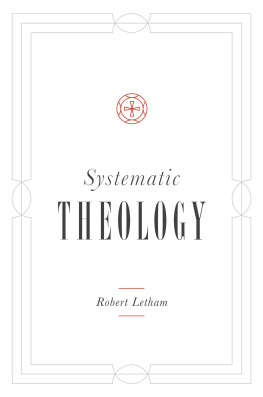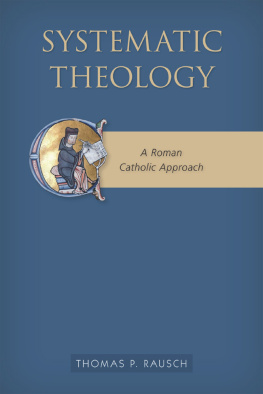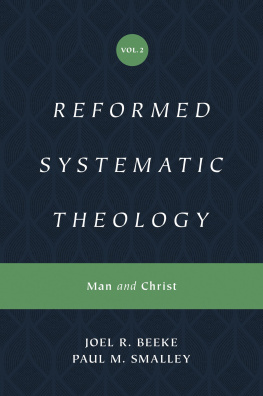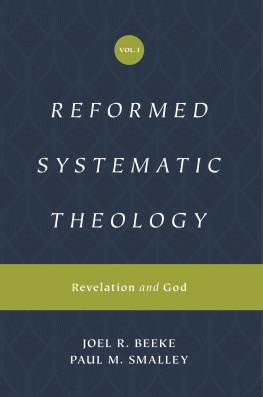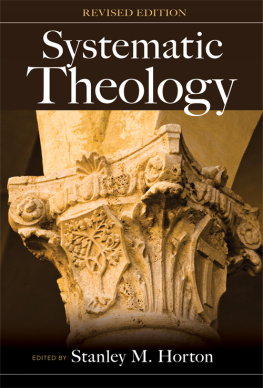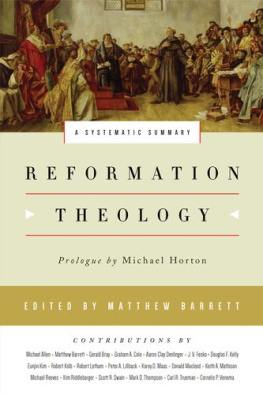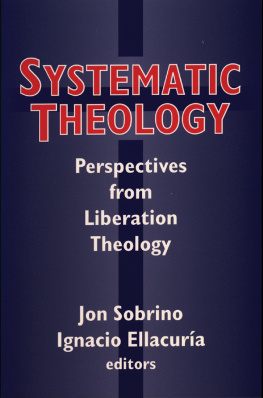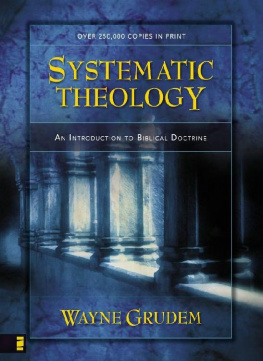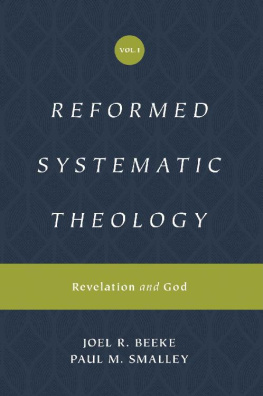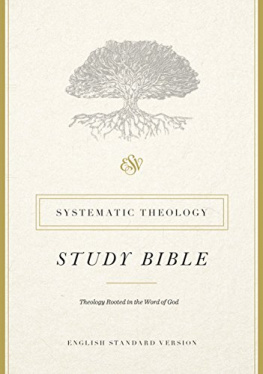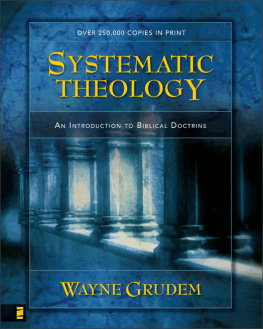Robert Letham - Systematic Theology
Here you can read online Robert Letham - Systematic Theology full text of the book (entire story) in english for free. Download pdf and epub, get meaning, cover and reviews about this ebook. year: 2019, publisher: Crossway, genre: Religion. Description of the work, (preface) as well as reviews are available. Best literature library LitArk.com created for fans of good reading and offers a wide selection of genres:
Romance novel
Science fiction
Adventure
Detective
Science
History
Home and family
Prose
Art
Politics
Computer
Non-fiction
Religion
Business
Children
Humor
Choose a favorite category and find really read worthwhile books. Enjoy immersion in the world of imagination, feel the emotions of the characters or learn something new for yourself, make an fascinating discovery.
- Book:Systematic Theology
- Author:
- Publisher:Crossway
- Genre:
- Year:2019
- Rating:3 / 5
- Favourites:Add to favourites
- Your mark:
- 60
- 1
- 2
- 3
- 4
- 5
Systematic Theology: summary, description and annotation
We offer to read an annotation, description, summary or preface (depends on what the author of the book "Systematic Theology" wrote himself). If you haven't found the necessary information about the book — write in the comments, we will try to find it.
Systematic Theology — read online for free the complete book (whole text) full work
Below is the text of the book, divided by pages. System saving the place of the last page read, allows you to conveniently read the book "Systematic Theology" online for free, without having to search again every time where you left off. Put a bookmark, and you can go to the page where you finished reading at any time.
Font size:
Interval:
Bookmark:
The Lords Supper and The sis
The Lords Supper is one of the principal means God uses to develop our communion with Christ and to conform us to his image. It is a memorial of Christ and his work, whereby the gospel is proclaimed in visual form, but it is also communion, in which the faithful are enabled by the Holy Spirit to feed on Christ. The Supper is efficacious by the Holy Spirit through faith and is joined to and dependent upon the Word as it is read and proclaimed. This process is termed the sis , by which we are made partakers of the divine nature (2 Pet. 1:4). This does not mean a blurring of the Creator -c reature distinction, but it does mean that we progressively are made like Christ so that when he returns in glory, we shall be like him.

In the Reformation and its immediate aftermath, the Lords Supper was the single most discussed topic. Martyrs were burned at the stake for their denial of the Roman dogma of transubstantiation. Intramural Protestant polemics attempted to explain the manner of Christs presence in the sacrament. Yet, under the impact of post -E nlightenment individualism, evangelicalism relegated the Supper to an optional extra. The eighteenth -c entury revivals led to a Christian being understood as someone who could claim a personal experience of conversion, with the work of the Spirit on the individual paramount and church and sacraments often seen as divisive.
26.1.1Biblical Foundations
Jesus instituted the Lords Supper on the night he was betrayed (Matt.
New Testament terminology . The New Testament terms express different dimensions of meaning. The Supper is called the breaking of bread Eucharist. It is a thanksgiving.
What happens in the Eucharist
It is a memorial . Jesus s words do this in remembrance of me are popularly understood to mean an act of memory on our part. In covenantal terms, it is more like the memorial stones Israel set up to record the mighty acts of Yahweh (Gen. 28:1822; Josh. 4:124 ).
It is a proclamation of the gospel (1 Cor. Whereas preaching brings the gospel to our ears, the sacraments portray it before our eyes. As we see a loaf of bread torn to pieces, the wine poured into a cup, so Christs body was given and his blood outpoured that we might receive life.
It is communion with Christ . Paul calls the Eucharist communion or participation in the body and blood of the Lord (1 Cor. 10:1617), relating to our union with Christ and its cultivation by the Holy Spirit as we eat and drink the material elements.
Does John 6:4758 have any bearing on the Eucharist? Debate has surrounded whether Johns description of Christ as the Bread of Life and our feeding on him refers to the sacrament. Many reject this connection. Two factors appear to support this reluctance. First, Jesus spoke these words before he gave instructions about the Eucharist. Would his words make sense if he intended to refer to the Supper? Second, some would say that to interpret this passage as sacramental leads us to view his statement about eating his flesh and drinking his blood as tantamount to cannibalism.
Against the first objection are many instances where Jesus mentions events before they happen. He referred to his death and resurrection, the gift of the Spirit, the persecution of the church, the destruction of the temple, church discipline, and the church itself long before those things came to be (Matt. 6:6071), while Jesus refers to Judass defection. This recalls the events when Judas, having received the bread, stalked out to betray Jesus .
The context. Having fed the five thousand, Jesus reflects on the miraculous feeding of the Israelites by Yahweh in the desert, claiming to fulfill this event. Jesus is the Bread of Life, given by the Father to sustain his people through their earthly pilgrimage (John 6:2540). He has come to feed and nourish us. Furthermore, this nourishment is eternal (vv. 3740). All those the Father has given Jesus will come to him, believing in him (v. 37). They will not be cast out but will be preserved in faith, be given eternal life, and ultimately be raised from the dead.
Jesus, the Bread of Life, is received through faith (vv. 4147). The Jews grumble at these claims, much as Israel in the desert had done. Jesus met with unbelief and consternation. He stresses that faith is a gift of God (vv. 4447) through which the Father draws us. He alone can break down this hostility. Jesus the Bread of Life is received through faith, the result of the Fathers gift.
This was scandalous! How can this man give us his flesh to eat? the Jews asked each other (v. 52). The shock and revulsion were clear! To drink blood was forbidden by the law and, before that, by the legislation given after the flood (Gen. 9:4). Animal blood was to be drained before the meat could be eaten (Lev. 3:17; Deut. 12:23). Still less was human blood acceptable.
Nevertheless, Jesus did not moderate his language or explain it as figurative. Rather, he intensified it. He did not back off or correct any possible misunderstanding. Instead, he boldly underlined his assertion. The crowd understood him only too well; their reaction was rational. Jesus insisted that the eating and drinking were very physical! From John 6066). Many abandon discipleship. Even the Twelve waver.
Obviously, Jesus does not advocate cannibalism. But neither can his language be emptied of its raw force. If he had wanted to offset the Jewish hostility, he had every opportunity to do so. If we view the narrative as connected with the Eucharist, there is a solution. By talking of our eating his flesh and drinking his blood, Jesus shows exactly how he, the Bread of Life, feeds and nourishes us to everlasting life. Christ is to us the Bread of Life as we feed on him, eating his flesh and drinking his blood in the Supper. This means two inseparable things, like two sides of the same coin. Believing, on the one hand; eating and drinking, on the other both go together, and both are necessary and indispensable.
First, we feed on Christ, the Bread of Life, through faith . The Eucharist is not magic, automatically conveying Gods grace. As the wilderness generation fell short, and Jesus s opponents did not believe, so without faith we cannot eat the true bread and receive eternal life. Moreover, Christ is the Bread of Life in his Supper . Jesus does not teach magic, but neither does he purvey an idealized, spiritual salvation divorced from the flesh. Eating and drinking go together with faith. The Supper is central to the gospel. The Supper without faith profits us nothing; faith without the Supper is barren. In the Lords Supper through faith, given by the Spirit, we eat Christs flesh and drink his blood and so are nourished to everlasting life.
What are the consequences of eating Christs flesh and drinking his blood in the Lords Supper through faith? First, we are granted union and communion with Christ by the Holy Spirit (v. 56). As we eat, food becomes one with us. It enters our system, and we digest it and so produce energy that enables us to live an active life. So when we eat and drink Christ, he enters our system, indwelling us, and we remain in him. We grow into union. There is mutual indwellinghe in us his church, we in him. This is a great mystery.
Second, we are introduced into the living fellowship of the triune God (v. 57). The living Father sent the Son. The Father has life in himself. He sent the Son in the incarnation, when the word became flesh and lived among us (John 1:14). In turn, he gave the Son to have life in himself (John 5:26), so that the Son lives because of the Father. Thus, the Son receives life from the Father. There is an inviolable order in the indivisible Trinity. Furthermore, we receive life from the Son as we chew him in the Eucharist. Has this ever been better expressed than by Calvin?
Font size:
Interval:
Bookmark:
Similar books «Systematic Theology»
Look at similar books to Systematic Theology. We have selected literature similar in name and meaning in the hope of providing readers with more options to find new, interesting, not yet read works.
Discussion, reviews of the book Systematic Theology and just readers' own opinions. Leave your comments, write what you think about the work, its meaning or the main characters. Specify what exactly you liked and what you didn't like, and why you think so.

